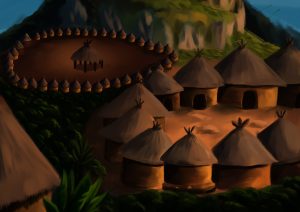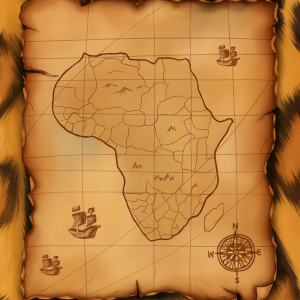The Battle of Karagbe: The Forbidden History — Africa’s Untold War Story That Rewrites World History
Introduction — Why This Book is a Global Game-Changer.
In a publishing world filled with recycled colonial narratives, The Battle of Karagbe: The Forbidden History by Tivzualumun (Terhemba T. Ngorngor) breaks the mold. It is not just a history book — it is an oral archive, a war memoir, a cultural manifesto, and an act of historical reclamation.
Rooted in the Imôngo Teman oral tradition of the Tiv people in Nigeria’s Middle Belt, this book dismantles the myth that Africa was a passive stage waiting for European ‘discovery.’ Instead, it offers a sweeping narrative of organized African resistance, spiritual warfare, and political sophistication — centered on the 19th-century United Middle Belt Army and the epic defense of the Tiv capital at Swem Mountain.
Decolonizing History — From ‘Discovered’ to Discoverers
For centuries, school textbooks, museums, and mainstream media have reinforced the same Eurocentric storyline: Europe ‘discovered’ Africa, brought civilization, and wrote the continent’s ‘true’ history. The Battle of Karagbe flips that script. The book makes a bold, evidence-driven argument: Africans discovered Europeans, interacted with them long before colonial conquest, and maintained complex political and spiritual systems that rivaled — and in some ways exceeded — European governance. This is not a speculative claim. Tivzualumun bases it on decades of interviews, community testimony, and preserved war songs, as well as a careful reading of geography, trade patterns, and military strategies.
The Forgotten Capital — Swem Mountain and the Tiv World
One of the most fascinating revelations in the book is the detailed description of Swem Mountain, the spiritual and political capital of the Tiv people during the pre-colonial era. From here, the United Middle Belt Army planned military campaigns, resolved inter-ethnic disputes, and performed rituals that connected the physical and spiritual realms. Swem was not an isolated fortress — it was the nerve center of an inter-linked African network that reached from Benue–Niger river trade routes to the Gulf of Guinea. The book maps these routes and explains how Tiv warriors could mobilize both military and mystical forces in times of crisis.
The United Middle Belt Army — Africa’s Forgotten Coalition Force
In Western historiography, the Middle Belt is often ignored in favor of coastal encounters between Europeans and West Africans. This book changes that by spotlighting the United Middle Belt Army — a coalition of Tiv, Idoma, Igala, Igede, Etulo, Jukun, Chamba, Basa, Nupe, and other ethnic groups who coordinated defense against external threats. Their arsenal was not limited to spears, bows, and shields. They deployed psychological warfare, invisibility rituals, and spiritual weapon enhancement techniques passed down for generations. This ‘dual warfare’ — physical and spiritual — was a hallmark of Tiv resistance and the middle belt.
The Spiritual Battlefield — African Warfare Beyond the Physical
One of the most captivating sections of The Battle of Karagbe is its deep dive into spiritual warfare. The Tiv belief system did not separate religion from defense — war preparations included rituals that could multiply arrows, cause enemy weapons to malfunction, or allow warriors to fight without sustaining injuries. This is not framed as superstition. The book treats these practices as a legitimate, time-tested system of community defense — as integral to Tiv warfare as supply chains and battle formations.
The ANYAM-U-II Network — A Pre-Colonial Intelligence Agency
Another groundbreaking revelation is the description of the ANYAM-U-II network — an elite intelligence and messenger system that connected the Tiv military leadership to allied communities across hundreds of miles. This network allowed for rapid mobilization, coordinated surprise attacks, and information dominance long before the telegraph or radio reached the region. In modern terms, the ANYAM-U-II was Africa’s own early ‘spy agency’, complete with coded signals, symbolic messages, and trusted couriers.
The Battle of Karagbe — Turning Point in African Resistance
The book’s central narrative builds toward the Battle of Karagbe — a clash between Tiv-led African forces and an alliance of external invaders, including European agents and African collaborators. Tivzualumun paints a vivid picture of the battlefield: leopard-skin-clad archers firing in coordinated waves, war drums echoing commands, spiritual leaders chanting protective incantations, and scouts relaying enemy positions via horn signals. Despite the military genius displayed, the battle was marred by betrayal, espionage, and foreign manipulation — factors that mirror today’s geopolitical interference in African affairs.
Attack on African Spirituality — The Hidden War
Beyond physical conquest, colonizers understood the need to dismantle Africa’s spiritual backbone. The book details systematic campaigns to discredit indigenous religion, replace ancestral shrines with churches, and criminalize ritual practices that were once central to community cohesion. This ‘spiritual disarmament’ weakened African unity and resistance capacity, creating a vulnerability that military force alone could not achieve.
Why This Book Matters Now
In the age of Black Lives Matter, Afro-futurism, and decolonial scholarship, The Battle of Karagbe: The Forbidden History is more than a historical account — it is a tool for rebuilding cultural confidence. It answers pressing questions: How did African communities defend themselves before colonial armies? What strategies allowed them to hold out for decades against better-armed forces? What lessons can modern Africa learn from this resistance?
SEO-Rich Takeaways for Researchers, Students, and the Curious
If you are searching for African resistance history, Middle Belt Nigerian history, Tiv people culture, or pre-colonial African military strategy, this book is a goldmine. It belongs in university African Studies programs, diaspora book clubs, Black History Month reading lists, and military strategy and anthropology syllabi. Its mix of oral history, maps, glossary, and chapter-by-chapter revelations make it as suitable for scholarly research as it is for general readers seeking truth.
How to Use This Book for Learning and Teaching
The book’s glossary, maps, and discussion-ready chapters make it ideal for secondary schools, community organizations, cultural festivals, and podcasts. Educators can focus on key chapters like The Awakening, The Revenge of the Ancestors, and Attack on African Spirituality.
Closing — Reclaiming the African Narrative
The Battle of Karagbe: The Forbidden History is more than a book — it is an act of memory recovery. By fusing oral tradition with accessible storytelling, Tivzualumun ensures that Africa’s untold war stories are no longer confined to the firesides of elders but are documented for global readership. In doing so, the book joins the growing movement to recenter African voices in world history, not as supporting characters in someone else’s story, but as protagonists in their own.
Where to Buy
The Battle of Karagbe: The Forbidden History is available in paperback, hardcover, ebook, and coming soon, audiobook formats. Search for it on Amazon, Konga, and leading African bookstores, or request it at your local library.
Suggested SEO Keywords
African history book, Tiv history, Middle Belt Nigeria, African resistance, Swem Mountain, United Middle Belt Army, African oral tradition, Africans discovered Europeans, ANYAM-U-II, The Battle of Karagbe, Terhemba Ngorngor, Tivzualumun.









